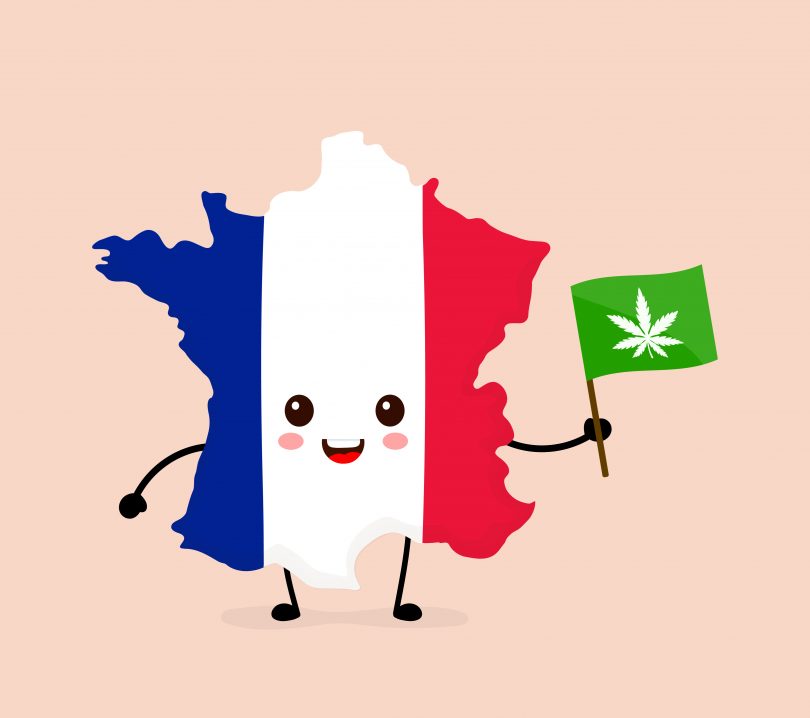There were rumors back in 2017 that France was on the verge of decriminalizing cannabis. Since then, the European state has come a long way and just announced a brand new experimental medical cannabis program.
May 28, 2019, will go down in French history as the day when the French Senate gave the green light to medical cannabis for the first time. The new proposal will immediately enter a two-year experimental phase, pending full approval from the French Health Ministry. That’s not just good; it’s great news for an estimated 300,000 – one million French citizens who suffer from chronic pain and other ailments.
According to a France24 report, “There will be about two years of experimentation with therapeutic cannabis, beginning as soon as the health ministry gives the green light,” Professor Nicolas Authier, the head of pharmacology at Clermont-Ferrand University Hospital Centre’s pain clinic said. He is in charge of the committee in France who were set up by the National Agency for the Safety of Health Products. The full committee report is set to be released at the end of June.
The French, who have fallen behind when it comes to a medical cannabis program so far, are looking to move fast with the new proposal. As Jean-Baptiste Moreau, from LREM’s, said to reporters, the new plan, “will be set up very quickly in the coming weeks.” He added that “The challenge is ensuring a French supply chain for the production [of these pharmaceutical products].”
However, the new proposal is fraught with issues as is usually the case with big moves such as this. As Authier explained, “For the moment, medical cannabis production is not authorized in France,” adding, “[the crops] will be grown in closed fields or greenhouses and will require significant investment. We will have to control the temperature, humidity, and sunshine. It isn’t conventional agriculture,” he said.
The EU has some tight cannabis regulations that countries need to adhere to
The experimental phase is expected to last until the middle of 2021. Until then, the French government intends to import pharmaceutical products until the French supply chain is in place. For now, France is facing a steep learning curve as they try to learn about growing hemp and cannabis and doing so within the tight framework of preexisting EU regulations.
In any event, cannabis distribution to patients will be very strictly controlled by authorities. Only qualified doctors will be allowed to prescribe cannabis, and that would only be as “a last resort, after trying other available therapeutic [pain] treatments,” Authier said.
The lack of common sense is so counter-intuitive it’s almost hard to fathom. In other words, patients need to abuse their bodies with often toxic, addictive pain medications like opioids, and if that doesn’t work, they can try cannabis. The irony would be cute if it weren’t so misguided and immoral.
While many on the conservative side of French politics are worried that medical cannabis could lead to recreational legalization, Authier does not take that view. “There is little risk that medical cannabis will be abused for recreational purposes,” he said. “It has different users with different objectives. Those who take codeine for pain, and those who smoke opium are taking the same substance, but they don’t have the same purpose. Similarly, medical-grade cannabis will not satisfy those looking for psychoactive effects.”
At the same time, according to the French Observatory for Drugs and Drug Addiction, cannabis will be cultivated to contain lower amounts of THC – the compound in cannabis that makes you high, and more CBD – the compound associated with health that doesn’t come with psychoactive effects. But as Authier pointed out, explaining the reserved French stance on cannabis, “Therapeutic cannabis is not a drug, it is medication. The question of legalization won’t come up before 2021, and only following this experiment,” he said.
It remains to be seen how the new French initiative for medical cannabis will pan out. It is, however, an interesting move by French authorities who are keeping a keen eye across the pond to watch cannabis legalization developments in North America.
